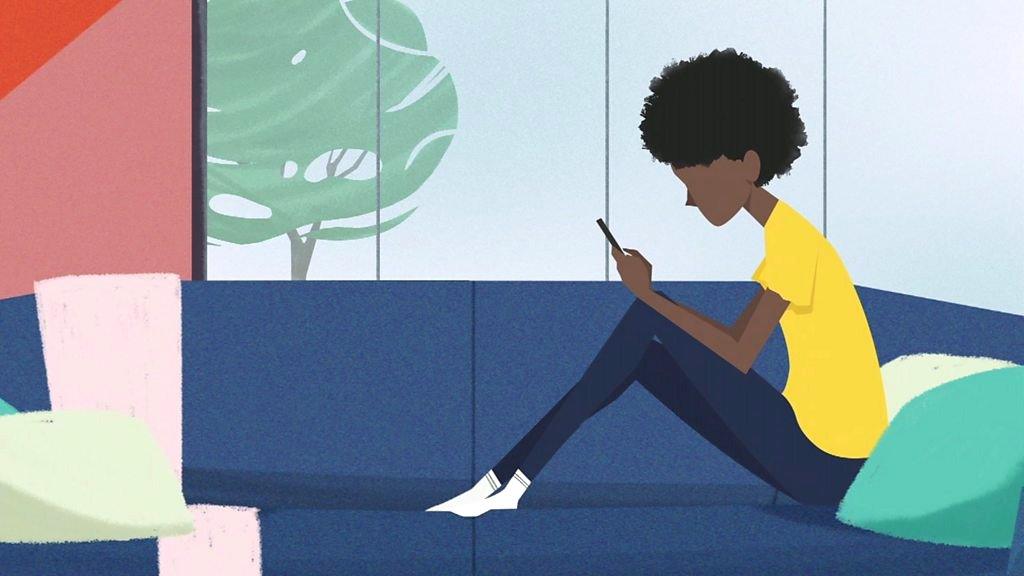Coronavirus and lockdowns: What is the latest?
- Published
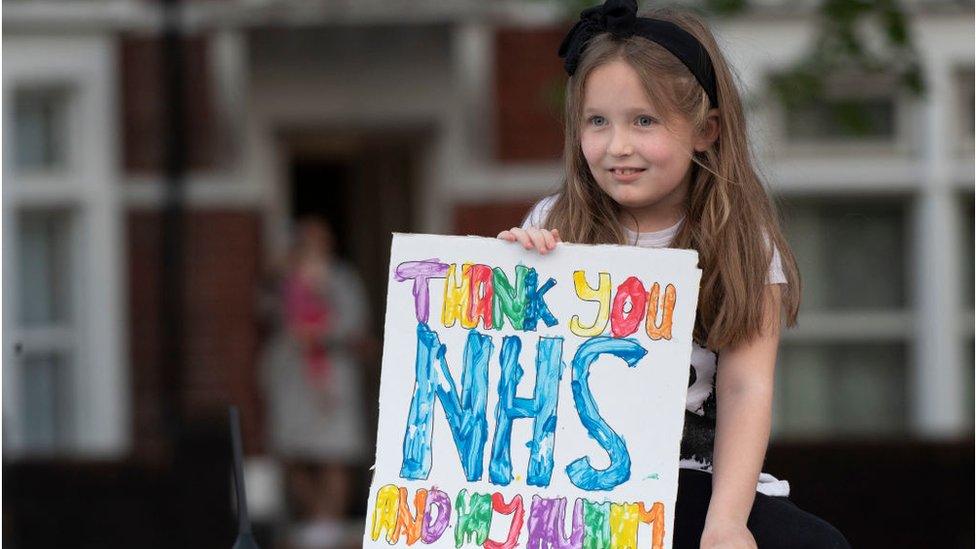
Rules limiting how many people can meet, sticking to your bubble in school, social distancing and regularly washing your hands - there have been lots of changes to our way of life.
It's all down to the discovery of a new flu-like coronavirus which has been spreading around the world since the start of 2020.
The virus causes an illness called Covid-19, though lots of people still refer to it as 'coronavirus' as that is how it was known at first.
Scientists and governments are working hard to stop the spread of the coronavirus and to roll out vaccines to stop people getting it.
Here's the latest on what's being done about it - you can navigate around our guide by picking a topic and using these links.
Where are we now?

The response to the coronavirus pandemic has led to big changes in the UK affecting schools, jobs, sports and how we live our lives.
Leaders have been trying to react to rises and falls in the spread of the virus, with the majority of spring and early summer of 2020 being spent in lockdown.
After periods when different parts of the country were under different rules, most of the UK started 2021 in lockdown with people being told to stay at home, because of a rise in cases and a new variant of the virus.
Although politicians aim to keep the four UK nations on similar paths, there are different rules in each of the nations according to the situations faced in those countries.
More: Why are there different rules in different parts of the UK?
However, from March 2021, those rules have been gradually easing with the UK's four countries setting out plans to return to a more normal way of life.
There has also been a lot of work done all around the world to create vaccines for coronavirus, which are being given to adults in the UK - with millions of people having received a jab.
If you cannot see this interactive guide, click here.
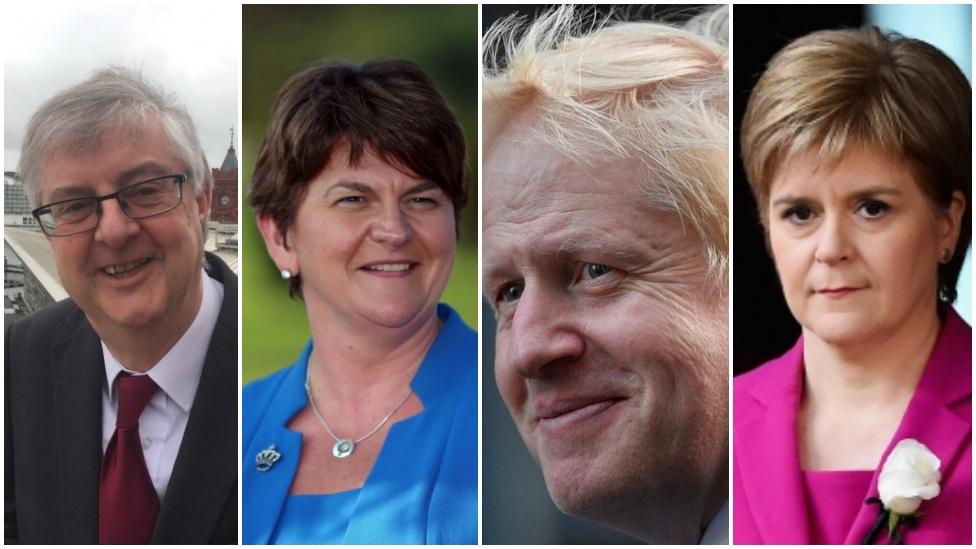
The leaders of the UK nations: Welsh First Minister Mark Drakeford, Northern Ireland's First Minister Arlene Foster, Prime Minister Boris Johnson and Scottish First Minister Nicola Sturgeon
Coronavirus restrictions are regularly reviewed and changed when necessary, based on advice, guidance and evidence from experts.
Throughout 2020, governments made the rules stricter, relaxed them and made them stricter again, depending on the advice of scientists who monitor the spread of the disease.
For example plans to relax rules over Christmas 2020 were announced, but when case numbers went up, politicians and scientists then recommended that people mixed as little as possible.
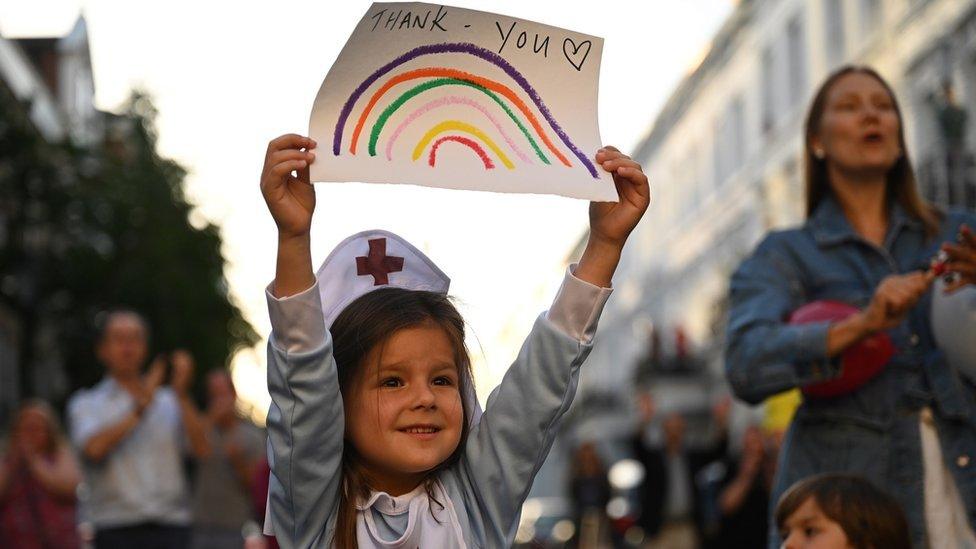
At the start of 2021, scientists raised concerns over a rising number of cases and the pressure being put on the NHS.
Covid-19 meant there were more people going to hospital, on top of those who would already be going because of other illnesses or injuries.
To tackle rising numbers of coronavirus cases and to stop the virus spreading, from late 2020 and early 2021, Wales, Northern Ireland and then Scotland and England entered nationwide lockdowns.
WATCH: Dominoes show how social distancing can help
The stricter rules in the UK were also brought in due to the effects of new variants of the coronavirus.
Sometimes when a virus makes copies of itself, it can mutate - or change - a bit. The virus with these changes or mutations is then called a 'variant' of the original virus.
It is normal for viruses to change. Like all living things, including humans and animals, viruses constantly evolve and develop, and this will continue to happen with the coronavirus.
Professor Alan McNally, an expert at the University of Birmingham, described it as "normal virus evolution", adding that "we expect new variants to come and go and emerge over time".
You may have heard of some of the main variants, including the Indian, South African or Brazilian variant, which are slightly different versions of the virus.
The World Health Organization (WHO) - that's the part of the United Nations whose aim is to look after the health and well-being of people around the world - has now said they should be named after the letters of the Greek alphabet.
The Delta (Indian) variant has become dominant in the UK with the latest scientific advice that the variant is 40% more transmissible than the Kent strain which led to the lockdowns at the end of 2020 and start of 2021.
Although there's no strong evidence that the new variants cause different symptoms, the virus does appear to spread more easily meaning it could lead to more people being infected.
As it is a new virus, scientists around the world have been working hard to develop vaccines.
Vaccines are seen as key for finding a way to learn to live with coronavirus and get our lives back to normal.
The UK was the first country in the world to approve one of the new coronavirus vaccines - made by pharmaceutical firm Pfizer and its partner BioNtech - for widespread use.
That means British medicine experts, the regulator MHRA, said it was safe to use.
A vaccine developed at the University of Oxford has also been approved by regulators in the UK. And, in April 2021 another vaccine began to be rolled out in the UK - the Moderna vaccine.
BBC Health correspondent Anna Collinson answers some key questions about the approved Pfizer vaccine
So far, more than three quarters of adults in the UK (over 40 million people) have been given the first jab, while over 27 million have had two doses. This includes adults over 30, young people who are vulnerable, elderly people and healthcare workers, to help protect them.
A granny called Margaret from Northern Ireland was the first patient in the UK to get vaccinated and 16-year-old Esther has become one of the youngest people in the country to be given a coronavirus vaccine.
Prime Minister Boris Johnson has described it as the "biggest vaccination programme in our history".
Nine groups of at-risk people were at the top of a priority list to have the vaccine, with care home residents and workers first, and frontline health workers next.
Most of the vaccine tests were done on adults, but now that they have been found to be safe, tests with children around the world have also been happening.
There are no plans yet for most children to get vaccinated but the UK's medicine regulator, the MHRA, has approved the use of the Pfizer vaccine for 12 to 15 year olds.
It says the vaccine is "safe and effective" and that the "benefits far outweigh any risk".
But this doesn't mean children will be given the vaccine. That's a decision that will be made by the UK's vaccine committee.
Even if children and teenagers aren't given the jab, they will benefit from others having it because of something called herd immunity.
WATCH: Meet the experts behind 'brilliant' Covid-19 vaccine
Vaccines have to go through lots of tests to make sure they are safe to use, and this can take time.
There are also challenges once a successful vaccine is found, for example making sure there are enough doses to go around, getting them to the people who need them most, and ensuring that enough people choose to have it.
Until then, the only way to prevent the virus spreading is to limit physical contact with people who have it.
From the week beginning 8 March, all pupils in English primary and secondary schools returned to the classroom, following two months of lockdown and online learning at home.
Pupils in Wales and Scotland started to go back after February half term, but in a staggered way.
Pupils in Northern Ireland primaries one to three returned to schools on 8 March, and in April all students returned.
From after the Easter holidays schools are open again to all children in the UK.
Some pupils in secondary schools have been advised to wear masks and have had to take regular rapid coronavirus tests - in school at first and then at home.
The aim is try to identify people who might have the virus but not have any symptoms, so they can stay off school.
Summer Term in Lockdown - A Newsround Special
All the UK nations say keeping pupils in schools is a big priority and very important for their futures, but when children are in class it can feel different.
The aim is to try to limit the spread of coronavirus in schools and there have been lots of changes to the normal school day, with one-way systems, staggered lunchtimes, more hand-washing stations and even getting dressed for PE lessons at home!
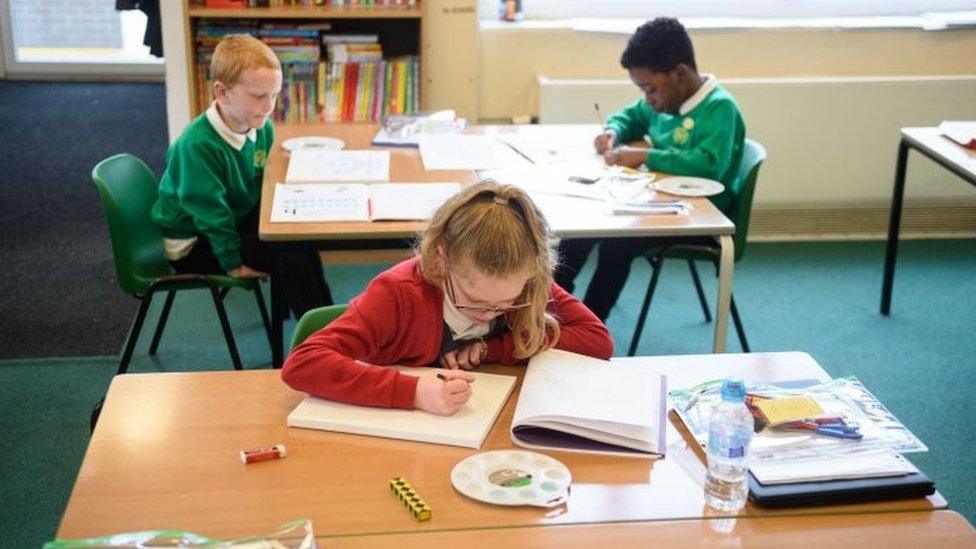
Pupils at some schools had to sit further apart from each other than normal
Despite that, even when schools have been open, many pupils have had to go home, self isolate and do their school work online because children in their year bubble have tested positive.
Experts have warned about the problems of children missing too much school and falling behind.
The changes have also affected exams with SATs, GCSEs, A-Levels and Nationals being cancelled.
It is compulsory for people in England, Scotland, Wales and Northern Ireland to wear face coverings on public transport or if they go into shops and supermarkets.
Some people - for example if they have breathing disabilities - don't have to wear them.
Some children don't have to wear them either - although this depends which country you live in, as the rules vary in different parts of the UK.
Secondary school pupils in Scotland and Northern Ireland are asked to wear masks in communal school areas. In Wales, it is up to schools and councils to decide if face coverings are used, and in England from 17 May pupils will no longer need to wear them in classrooms and communal areas.
The WHO says proper medical masks only need to be worn by people with symptoms or by carers or medical professionals looking after people with Covid-19.
But it advises that face coverings should be worn in busy areas where social distancing is not possible.
There are two main types of test for coronavirus being used in the UK.
The standard NHS test - also known as a PCR test - involves a swab being taken of your nose and throat. That swab is sent away to a lab to be processed to see if you have the virus in your system. This normally takes a couple of days during which time you have to self-isolate.
The second main test is the quick turnaround - or lateral flow - test. These can give you a result in 20 - 30 minutes but are less reliable than the PCR test.
However they are seen as an important way of quickly testing large numbers of pupils in schools, and also for mass testing groups of people in areas where experts think the virus is spreading.
What's it like having rapid coronavirus testing in your school?
Each country has also set up a system to try to track who may have coronavirus and to alert other people they might have been in contact with.
Successful test and trace systems help to control the virus and also help to tell the people in charge when it's safe to ease restrictions - or if restrictions need to be put back in place.
WATCH: What is a contact tracing app and how does it work?
A phone app to help with this was tested by the UK government on the Isle of Wight before being dropped, though a new version for England and Wales launched on 24 September 2020.
Northern Ireland launched its own app for adults to use at the end of July 2020, and Scotland's app came out in early September last year.
Testing people to find out if they have the virus is also really important. It can help the government track cases and make sure they are looking after those who are ill, and stop them passing it on to others.
The coronavirus is a respiratory virus - that means it affects people's breathing and lungs. Like the cold and flu bugs we get in the UK, it can spread from person to person by coughing, or contact with contaminated surfaces or skin.
It can lead to more serious illnesses like pneumonia. This is dangerous for vulnerable people, such as the very old or people who are weaker due to other illnesses.
The disease has been linked to a large number of deaths in the UK, and health officials say that most of these were elderly people, or people who already had other health issues.
Symptoms include fever, a cough, and a loss of smell or taste.
The virus has been declared a pandemic by the World Health Organization, or WHO.
A pandemic is a disease that spreads in a number of countries around the world at the same time.
The first cases were identified in Wuhan, a city in China. It is thought it might have come from bats at a wildlife market there.
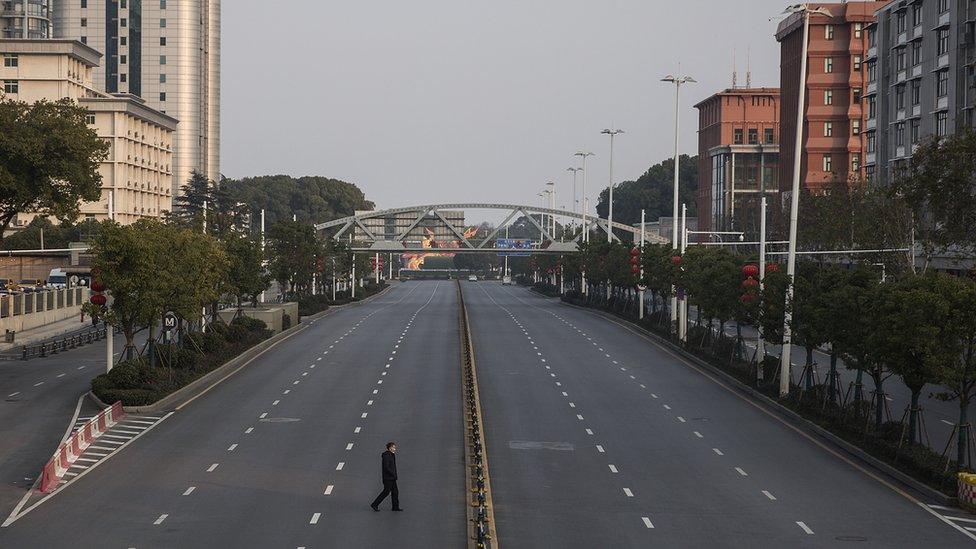
The streets of Wuhan, in China, were pretty quiet after the government locked the city down
The WHO is a special group, which is part of the United Nations.
It was formed in 1948 and its aim is to look after the health and wellbeing of people around the world.
Since it began, it has done lots of medical work. For example, it helped to rid the world of the smallpox disease - the first disease to ever be officially wiped out by human effort.
The organisation is full of scientists and doctors who are helping to improve world health by stopping the spread of diseases and educating people about being healthy.
It also holds World Health Assemblies at which people discuss new diseases or disorders, and how they can be treated.
- Published5 January 2021
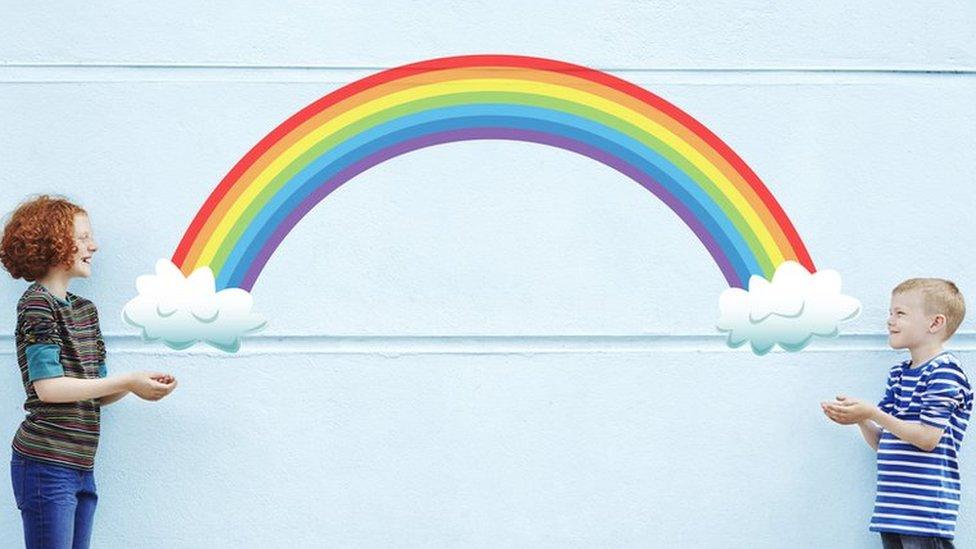
- Published11 March 2020
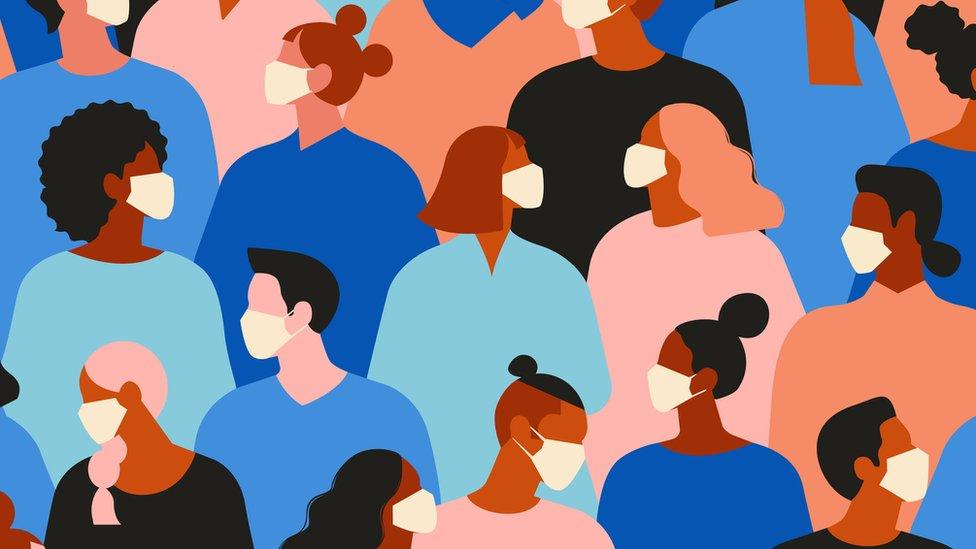
- Published16 March 2020
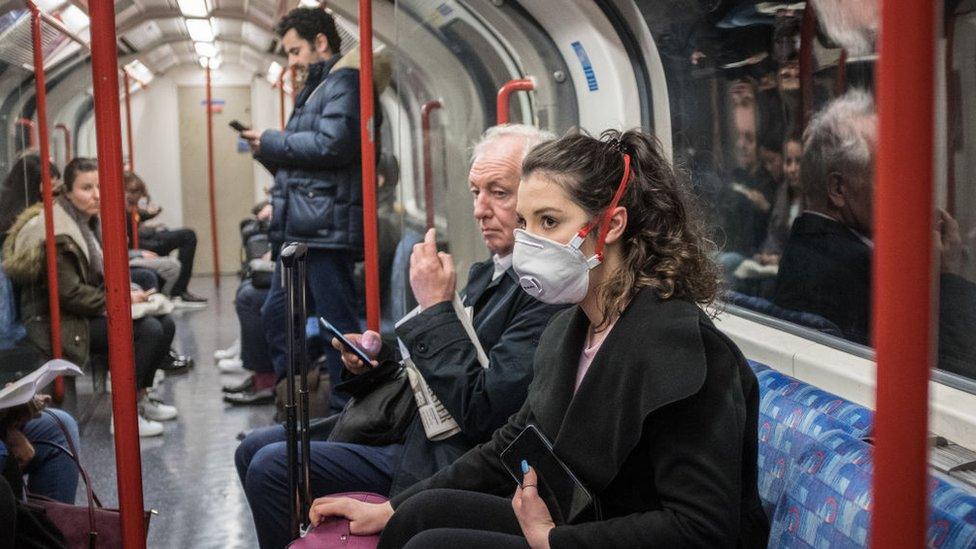
- Published19 November 2020
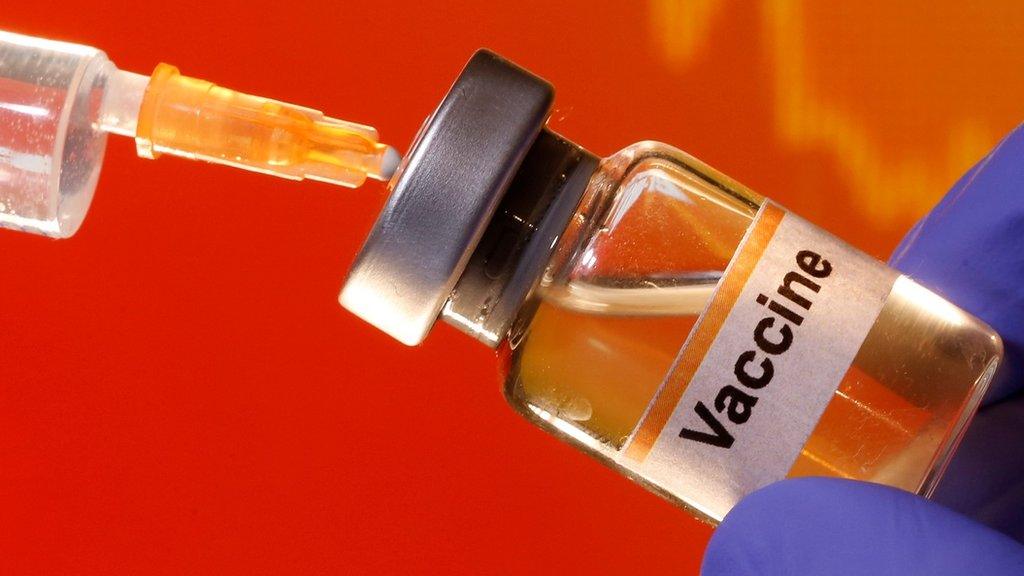
- Published24 November 2020
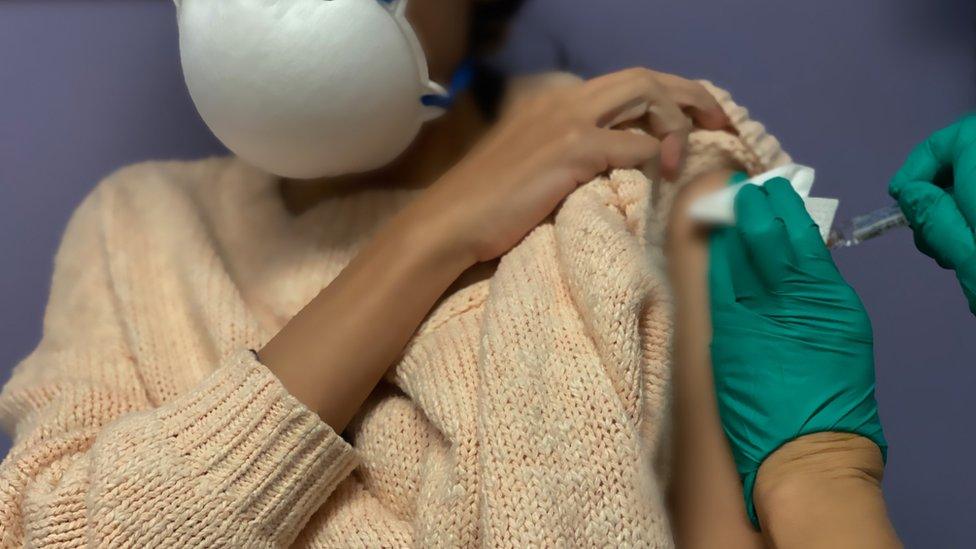
- Published18 September 2020
